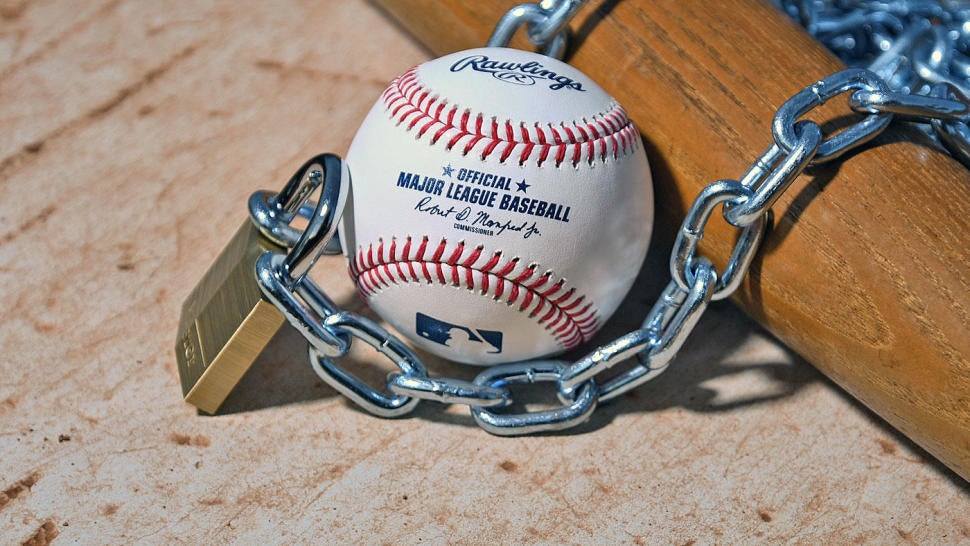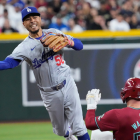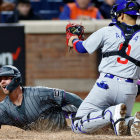MLB lockout news: League cancels more games after talks stall; April 14 now earliest possible Opening Day
Negotiations appeared to be progressing on Wednesday, but things fizzled and MLB called off more games

On Wednesday, MLB commissioner Rob Manfred announced another wave of regular season cancelations. Opening Day has been postponed until at least April 14, effectively canceling another two series for each team. Last week Manfred announced the first two series of the 2022 regular season had been canceled. Opening Day was originally scheduled for March 31.
The cancellations come after two days of marathon bargaining sessions between MLB and the MLB Players' Association failed to result in a new collective bargaining agreement. Here is Manfred's statement on the latest wave of cancelations:
"In a last-ditch effort to preserve a 162-game season, this week we have made good-faith proposals that address the specific concerns voiced by the MLBPA and would have allowed the players to return to the field immediately. The Clubs went to extraordinary lengths to meet the substantial demands of the MLBPA. On the key economic issues that have posed stumbling blocks, the Clubs proposed ways to bridge gaps to preserve a full schedule. Regrettably, after our second late-night bargaining session in a week, we remain without a deal.
"Because of the logistical realities of the calendar, another two series are being removed from the schedule, meaning that Opening Day is postponed until April 14th. We worked hard to reach an agreement and offered a fair deal with significant improvements for the players and our fans. I am saddened by this situation's continued impact on our game and all those who are a part of it, especially our loyal fans.
"We have the utmost respect for our players and hope they will ultimately choose to accept the fair agreement they have been offered."
"The owners' decision to cancel additional games is completely unnecessary," the MLBPA said in a statement. "After making a set of comprehensive proposals to the league earlier this afternoon, and being told substantive responses were forthcoming, Players have yet to hear back. Players want to play, and we cannot wait to get back on the field for the best fans in the world. Our top priority remains the finalization of a fair contract for all Players, and we will continue negotiations toward that end.
The owner-imposed lockout is approaching its 100th day and MLB set another "soft" deadline for canceling games Tuesday. That deadline was pushed to Wednesday following 17 hours of bargaining, and while the two sides did close the gap on some economic matters, the biggest sticking point right now is an international draft. MLB wants one and the union opposes it.
The running the tally is four canceled series for each of the 30 teams. In general, each team plays roughly two series per week throughout the season, so this is tantamount to canceling two weeks of the season. The two sides remain on contact as of Wednesday evening, though ESPN's Marly Rivera classifies it as "communication" rather than "negotiation."
Here are five takeaways from the latest round of bargaining and cancellations.
1. Jackie Robinson Day could be in jeopardy
Perhaps part of the focus here should move toward Jackie Robinson Day. This is an event celebrated annually by Major League Baseball on the anniversary of Robinson breaking the color barrier in 1947. April 15, 1947 was Opening Day that season and every year on that day, starting with the 2004 season, MLB has celebrated, more recently moving toward every player wearing Robinson's No. 42 (it's otherwise retired across the league).
April 15 falls on a Friday this year and the date is in a precarious situation on the MLB calendar, though there's also a chance it could mark a triumphant return. The first four series being canceled gets us through April 14. If the owners keep the lockout intact and an agreement isn't reached, the next batch of cancellations will include Jackie Robinson Day on the 75th anniversary of his MLB debut.
This would then mark the second year out of three that MLB missed an April 15 commemoration of Robinson. In 2020, the season was delayed for months due to the COVID-19 pandemic and Jackie Robinson Day was held on Aug. 28.
2. International draft is now a sticking point
Within the last 48 hours or so, an international draft has become a hot topic. MLB wants one and has for years, and the MLBPA opposes it. "The international draft is going to kill baseball in Dominican Republic. It's going to affect us a lot, because there will be many young people who used to give them the opportunity to get a bonus and with the draft it will not be the same," Padres star Fernando Tatis Jr. said Tuesday.
The international draft has been in every MLB proposal since last year and the MLBPA has rejected it every time, yet it came to the forefront Wednesday when the league set an ultimatum. MLB has tied the elimination of the qualifying offer, something the MLBPA wants, to the international draft and told the union it would not counter its latest proposal unless it chose one of three options:
- Eliminate the qualifying offer and create an international draft.
- Qualifying offer remains with no international draft.
- Eliminate the qualifying offer and discuss an international draft later.
For the third option, MLB wanted an international draft in place by Nov. 15, 2022, or it would get the ability to reopen the entire collective bargaining agreement after 2024. The union rejected all three options and instead proposed eliminating the qualifying offer system, then bringing it back if not international draft deal was reached by Nov. 15. MLB did not respond.
The league proposed a complicated international draft with set bonuses and a rotating order that is not tied to team record. Players outside the United States, Canada, and Puerto Rico are currently free to sign with any team once they turn 16. Each team is given a set bonus pool to spend on international players each year. It is usually in the $4 million to $6 million range.
3. Gaps were closed on core economic matters
It's not all bad news. MLB and the MLBPA did significantly close the gaps on several core economic matters this week, the matters that, well, matter the most during these talks. Here's where each side stands on the most important economic items:
| 2021 | MLB | MLBPA | |
|---|---|---|---|
Minimum salary | $570,500 | $710,000 in 2022 climbing to $770,000 in 2026 | $725,000 in 2022 climbing to $780,000 in 2026 |
Competitive balance tax threshold | $210 million | $230 million in 2022 climbing to $242 million in 2026 | $232 million in 2022 climbing to $250 million in 2026 |
Pre-arbitration bonus pool | N/A | $40 million with no increases | $65 million with $5 million increases each year |
The minimum salary and competitive balance tax proposals are close enough now that the two sides could reach a consensus as soon as the next offer. The gap with the pre-arbitration bonus pool remains sizeable, though nothing that can't be worked out. Point is, MLB and the MLBPA are getting very close on money, and that was not the case even a week ago. That's progress.
4. This all got a little more complicated
The calendar says a 162-game will soon become impossible -- MLB said 162 games could have been played a deal been struck Wednesday -- and last week Manfred said "our position is games that will not be played, players will not be paid for." The union rejects that notion, and has threatened to withhold an expanded postseason field if players are not paid their full salaries (with canceled games rescheduled).
What this means now is that on top of all the collective bargaining issues, MLB and the MLBPA now have to negotiate salary and service time. You may remember they haggled over this during the pandemic shutdown in 2020 and were ultimately unable to reach an agreement. Eventually the union gave up bargaining and allowed Manfred to unilaterally schedule the season with prorated pay, a one-time power granted to him in that year's March Agreement.
The number of games played, how much players are paid for those games, and the schedule itself are all subject to bargaining. Manfred can not unilaterally implement a shortened season with prorated pay. MLB and the MLBPA will have to agree to those terms and that's another layer of complexity on top of an already complex negotiation. Bottom line, this just got a lot messier.
5. We'll do this again next week (probably)
At this point it's fair to assume MLB will cancel games on a week-by-week basis until a deal is struck. That means we're likely to see what we've seen the last two weeks -- marathon bargaining sessions with proposals and counter proposals -- each week moving forward. We'll hear one side is optimistic, the other is being unreasonable, etc. Everything we heard the last two weeks will happen over and over each week until an agreement is in place.
They're not done yet ...
MLB and the MLBPA are still talking about the international draft:
Should the two sides reach an agreement soon, could they hammer out the rest of the CBA and un-cancel those games? I guess we'll find out. Fingers crossed.
MLBPA responds
And a new wrinkle in talks will enter when they next meet...
No more negotiations on the books
Another week, another two-day marathon that ends without a deal for a new CBA. The sides appeared to get close to a deal this week in New York (at least much closer than last week in Florida), but as of now they don't have another bargaining session scheduled.
MLB reportedly refused to respond MLBPA's latest counteroffer, so the ball is back in the league's court here.
More games canceled
As expected, commissioner Rob Manfred announced another round of cancellations after today's bargaining sessions did not lead to a deal. Opening Day has been postponed until at least April 14, effectively canceling another two series per team. April 15 is the 75th anniversary of Jackie Robinson breaking the color barrier, and games that day remain on the schedule.
Let's check in on Evan Longoria
Seems the most likely path to a deal now is keep the qualifying offer, no international draft, then meet somewhere in the middle on minimum salary, pre-arbitration bonus pool, and competitive balance tax.
















